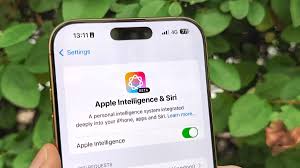iOS 18.1 and Beyond – Siri’s Apple Intelligence Features, integrating advanced Apple Intelligence capabilities that redefine the personal assistant’s role. These updates not only enhance user experience but also signal a significant leap in the intersection of artificial intelligence and everyday technology. Siri, with its upgraded contextual understanding, real-time processing, and broader functionality, is now positioned to act as a more intuitive and capable assistant in iPhones and Apple’s broader ecosystem.
The Evolution of Siri and Its Role in Apple Devices
Siri has evolved significantly since its introduction in 2011. What began as a basic voice-activated tool for setting reminders, sending texts, and conducting web searches has transformed into a cornerstone of Apple’s ecosystem. The recent updates in iOS 18.1 emphasize the company’s commitment to advancing AI to meet the complex needs of modern users. These changes make Siri more adaptable, interactive, and contextually aware than ever before.

Key to this evolution is the development of Apple Intelligence, a proprietary framework that leverages on-device processing, cloud-based learning, and integration across Apple devices. This means Siri not only responds faster but also offers more nuanced, relevant assistance, from understanding user preferences to providing proactive suggestions based on real-time data.
What Sets Apple Intelligence Apart
Apple Intelligence distinguishes itself through a combination of privacy-focused AI and seamless device integration. Unlike competitors that heavily rely on cloud processing, Apple emphasizes on-device machine learning, ensuring user data remains secure while enabling Siri to process requests locally. This focus on privacy sets the stage for features like real-time transcription, offline voice commands, and personalized responses tailored to individual habits.
One standout feature in iOS 18.1 is Siri’s ability to interact across devices without explicit commands. For instance, if you are listening to music on your iPhone and move to your MacBook, Siri intuitively transitions playback to the new device without interruption. This cross-device awareness exemplifies the level of sophistication brought by Apple Intelligence.
Practical Applications of Siri’s Enhanced Features
Siri’s updates in iOS 18.1 extend far beyond basic functionality. The personal assistant now excels in areas such as multitasking, productivity, and accessibility. One of the most significant advancements is its ability to manage complex workflows through voice commands. For example, you can now instruct Siri to prepare a report using data from an app, schedule a meeting with specific colleagues, and email the details—all in one interaction.
Another innovative feature is Siri’s integration with Apple’s ecosystem for health and fitness. Using real-time data from the Apple Watch, Siri can proactively suggest hydration reminders, offer workout insights, and adjust daily goals based on activity levels. For users managing chronic conditions, Siri’s ability to monitor health trends and provide alerts based on set parameters enhances its utility as a health assistant.
Enhanced Language Support and Accessibility
One of the standout improvements in iOS 18.1 is Siri’s expanded language support. Apple Intelligence now supports nuanced dialects and accents, allowing for more accurate responses in a wider range of languages. This ensures a more inclusive experience for users worldwide. Additionally, Siri now incorporates real-time language translation during conversations, making it a valuable tool for travelers and multilingual individuals.
In terms of accessibility, Siri’s upgrades cater to users with disabilities by introducing customizable voice commands and improved screen-reading capabilities. These features align with Apple’s broader commitment to accessibility, ensuring that technology remains inclusive and functional for all users.
Comparative Analysis of Siri’s Features
The competition in AI-driven virtual assistants remains fierce, with Google Assistant and Amazon Alexa also vying for dominance. However, Siri’s updates in iOS 18.1 offer unique advantages, particularly in the areas of privacy and ecosystem integration.
| Feature | Siri (iOS 18.1) | Google Assistant | Amazon Alexa |
|---|---|---|---|
| Privacy | On-device processing | Cloud-based processing | Cloud-based processing |
| Integration | Seamless within Apple devices | Android and Google ecosystem | Smart home ecosystem |
| Language Support | Nuanced accents/dialects | Broad but less nuanced | Moderate language options |
| Offline Functionality | Extensive | Limited | Minimal |
The Future of Siri and Apple Intelligence
The advancements seen in iOS 18.1 are only the beginning. Apple continues to invest heavily in AI research, with future updates expected to expand Siri’s capabilities even further. Potential enhancements include deeper integration with third-party apps, improved real-world object recognition, and advanced predictive analytics to anticipate user needs more accurately.
Apple’s commitment to privacy will remain a cornerstone of Siri’s development. As artificial intelligence becomes increasingly pervasive, the challenge lies in balancing innovation with the ethical responsibility of protecting user data. Siri’s on-device processing model positions Apple as a leader in this regard, offering a blueprint for how AI can be both powerful and secure.
The release of iOS 18.1 with Siri’s enhanced Apple Intelligence features marks a significant milestone in personal assistant technology. By focusing on real-time processing, contextual understanding, and seamless integration, Apple has redefined what users can expect from their devices. Siri is no longer just a tool for executing commands; it is a proactive, intelligent partner in daily life, setting a new standard for innovation in AI-driven technology. As these features continue to evolve, they promise to further enhance the ways you interact with and benefit from your devices.









![Android Lock Screen Removal Software Free Download Best Android Lock Screen Removal Software Free Download [Best!]](https://techychemist.com/wp-content/uploads/2024/11/phone-1869510_640-470x264.jpg)
Add Comment